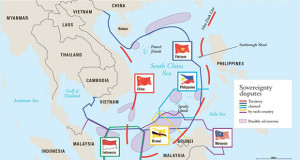There are several benefits to China if it is allowed to expand its Exclusive Economic Zone (EEZ), these include: additional sea resources, and increase their trading power amongst neighbouring countries; such as: creating a limit on the trading ships from other countries by Chinese authority. However, the expansion of the border of the South China Sea by United Nations which the Chinese government lobbied for was rejected based on the United Nations Convention on the Law of the Sea.
It is assumed that the Chinese economy has been growing and seems to want to conquer the wider region of the sea as much as possible for growing their economic power. If the Chinese claim was accepted they would control the natural sea-resources such as gas development, which is located near the border of the EEZ between China and Japan.
The Senkaku Island dispute is based on ties between China and Japan that have been strained by a territorial conflict over a group of islands. The Chinese tried to conquer the Senkaku Island in an effort to increase their natural reserves such as petroleum as seen in Figure 1. However, the Japanese government highlighted that the international law and historical background defines that the region around the island is owned by Japan.
 Figure 1 illustrates the location of the Senkaku islands and its proximity to the gas field.
Figure 1 illustrates the location of the Senkaku islands and its proximity to the gas field.
In relation to the Nine-dotted Line and its basis to international law, artificial islands were constructed by China where they claimed ownership of the region which would add an additional 22km of their EEZ in relation to the location of the islands. Their claims were rejected due to the fact that the sea level varies because of the daily tidal cycle, which cause the islands to vanish occasionally.
Figure 2 illustrates the Nine Dotted Line that governs the South China Sea and its adjacent neighbours
Sources:
China’s Shellacking the Rule of Law Collides with Strategic Imperative in the South China Sea
The Nine Dash Line and Its Basis in International Law
How uninhabited islands soured China-Japan ties

